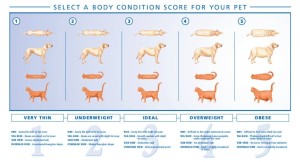I get the question of “what exactly should my dog weigh?”, more often than any other. Weight is a big issue, literally. In that I mean that so many dogs and cats are overweight in the general population, it is becoming as prevalent a problem as it is in the human population in this country. Maybe more. I heard on the radio the other day that normal weight people are the minority in this country. Whether or not this is translating to our pets is a complicated issue, and not what I want to discuss today. I feel that a big part of the problem with overweight pets is perception. So many clients perceive them as normal when I do not. I am constantly pointing to the body weight scoring charts, that look like this.
It shows grade 1-5, of progressive loss of waist, basically. More often, even, I will demonstrate whether or not you can feel ribs, and if so, are they under a layer, or series of layers, of fat, so much that you have to poke deeply to appreciate those ribs.
In terms of estimating how much is too much to feed, animals don’t make it easy for us. In addition to the inconsistency of perception within a household, there is the “irresistible” factor. Dogs and cats are hard to resist when they are begging. Let’s face it. Many of them are perfect. And when they want another treat, or 2, or 5, so many of us find it too difficult to say no to them. But, in fact, we should be saying just that. Also, many cats will wake you to feed them. Many pets will sneak into cabinets and containers where their food is kept and overeat. Some dogs will engorge to the point of illness. Many of us have seen the amazing You Tube videos. For example, the one with the Dalmation stealing the pop tart out of the toaster oven is funny, while being a little scary when you think about it.
Then there is the additional challenge is to predict the optimal weight for a mixed breed patient. A far greater number of my patients are mixed breeds, in contrast to pure breeds. Thus, those numbers are harder to predict, and you need to look at each individual patient, as they grow, and select a number that seems appropriate and healthy. But, for those of you pet parents with purebreds, I have the numbers for you! Hills Nutrition supplies a reference chart, if you can believe these numbers as accurate, and I am reproducing them here for reference. You can bring it up any time on my blog. Hopefully this will be helpful. (Sorry cat lovers. Fluctuations are too great, even within purebreds, for cats to get their own chart!)
Giant breeds Medium breeds
Bloodhound 80-110 lbs Airedale Terrier 42-55
Borzoi 55-105 American Water Spaniel 25-45
Bull Mastiff 88-130 Border Collie 30-45
Great Dane 121-176 Brittany Spaniel 30-40
Great Pyrenees 85-121 Bulldog 40-55
Irish Wolfhound 105-120 Bull Terrier 52-62
Mastiff 165-198 Chow Chow 44-70
Newfoundland 110-152 Clumber Spaniel 55-85
Rottweiler 88-110 Dalmatian 50-59
Saint Bernard 110-200 English Springer Spaniel 40-50
Scottish Deerhound 66-110 Field Spaniel 35-55
Large breeds Harrier 48-60
Afghan Hound 50-60 Keeshond 55-66
Alaskan malamute 75-126 Kerry Blue Terrier 33-40
Bernese Mountain Dog 88-110 Puli 22-33
Black & Tan Coonhound 55-80 Samoyed 37-66
Bouvier des Flandres 60-88 Schnauzer (standard) 33-40
Boxer 53-70 Siberian Husky 35-60
Briard 75 Staffordshire Bull Terrier 24-38
Chesapeake Bay Retriever 70-80 Sussex Spaniel 35-45
Collie 44-75 Welsh Springer Spaniel 35-45
Curly-Coated Retriever 70-80 Whippet 28
Doberman Pinscher 64-88 Wirehaired Pointing Griffon 60-60
English Foxhound 65-70 Toy breeds
English Setter 40-70 Affenpinscher 6.5-9
Eskimo 55-110 Australian Terrier 14
Flat-Coated Retriever 55-80 Brussels Griffon 5-12
German Shepherd 70-95 Cavalier King Charles Spaniel 10-18
German Shorthaired Pointer 45-70 Chihuahua approx. 6
Golden Retriever 55-75 Dachshund (miniature) approx. 11
Gordon Setter 45-80 English Toy Spaniel 8-14
Greyhound 60-70 Italian Greyhound 5.5-10
Irish Setter 60-70 Maltese 4-6
Irish Water Spaniel 45-65 Miniature Pinscher 10
Labrador Retriever 55-80 Norwich Terrier 10-12
Old English Sheepdog 55-65 Papillon 3.3-11
Pointer 45-70 Pekinese 7-14.3
Poodle (standard) 44-70 Pomeranian 3-7
Rhodesian Ridgeback 70-85 Silky Terrier 8-10
Schnauzer (giant) 67-77 Yorkshire Terrier approx. 8 lbs
Weimaraner 70-85
Small breeds
Basenji 22-24 Basset hound 40-60 (why is the basset hound in this category anyway?!)
Beagle 26-31 Bedlington Terrier 17-23
Border Terrier 11-16 Boston Terrier 15-25
Cairn Terrier 13-16 Dachshund (standard) 16-32
English Cocker Spaniel 26-34 Fox Terrier 15-18
French Bulldog 18-29 Irish Terrier 25-27
Lakeland Terrier 15-17 Manchester Terrier (standard) 12-16
Poodle (miniature) 11 Pug
Schipperke sm 7-11 lbs, lg 11-18 Schnauzer (miniature) 11-15
Scottish Terrier 18-22 Shih Tzu 9-18
Skye Terrier 25 Smooth Fox Terrier 15-18
Welsh Corgi (Cardigan) 25-38 Welsh Corgi (Pembroke) 22-30
Welsh Terrier 20-21 West Highland White Terrier 15-22
Wirehaired Fox Terrier 15-18
Their disclaimer: These average weight ranges for adults of each breed are based on information from veterinary nutritionists at Hill’s pet Nutrition, Inc. and Small Animal Clinical Nutrition, 5th Edition. These ranges should serve as a starting point for assessment. Remember, the weight of an individual animal depends on several factors such as breed, gender, body size, lifestyle and a pet’s spay or neuter status.
So, breeders who know more than I do about your specialty breed, etc, please note the WIDE range of weights in this chart and please use it as an approximation to better guide you as to the “norm” for the breed in question. I mean, just look at the variation in the Eskimo breed, for goodness sakes! Almost double the beginning weight on the high end. And, if your breed is not represented in this chart, then take it up with Hill’s. I just thought it might be a helpful reference to have on hand if needed.
Dr. Dawn
Please Share and SUBSCRIBE here





